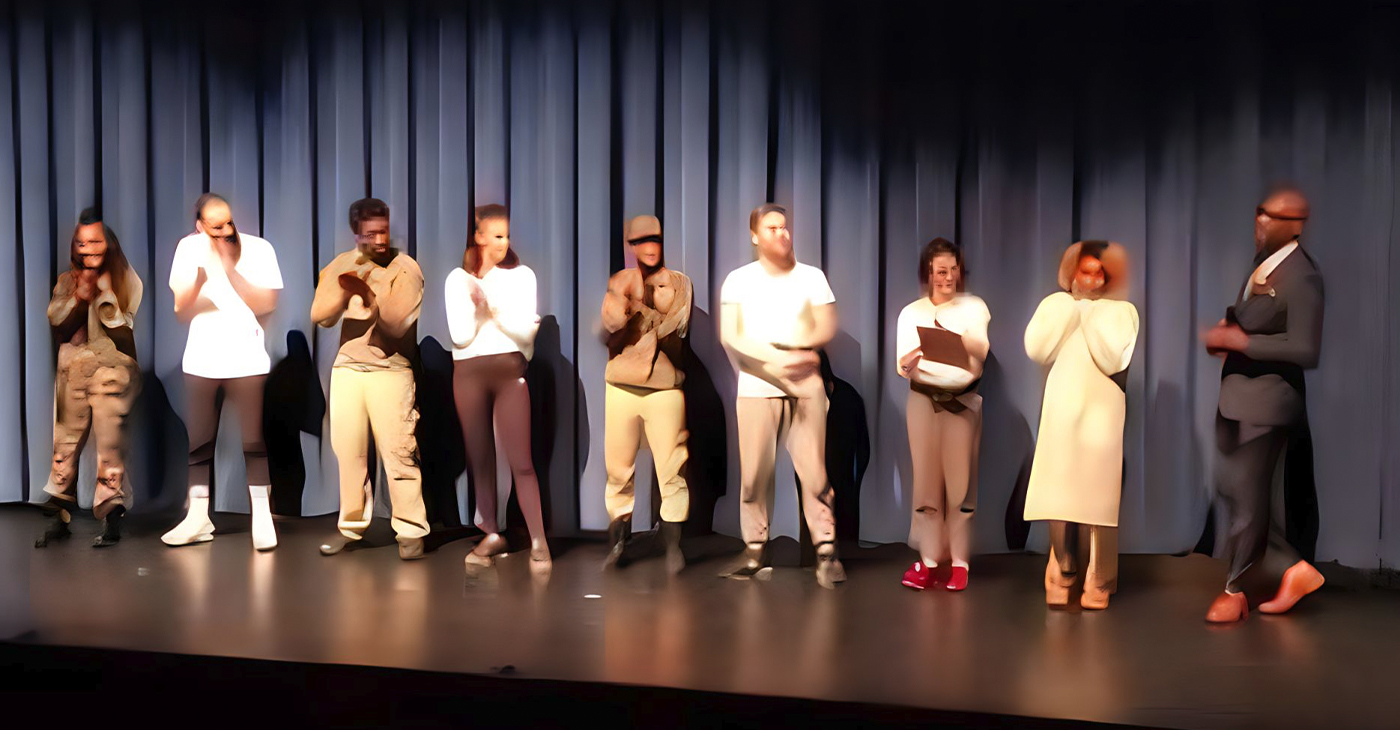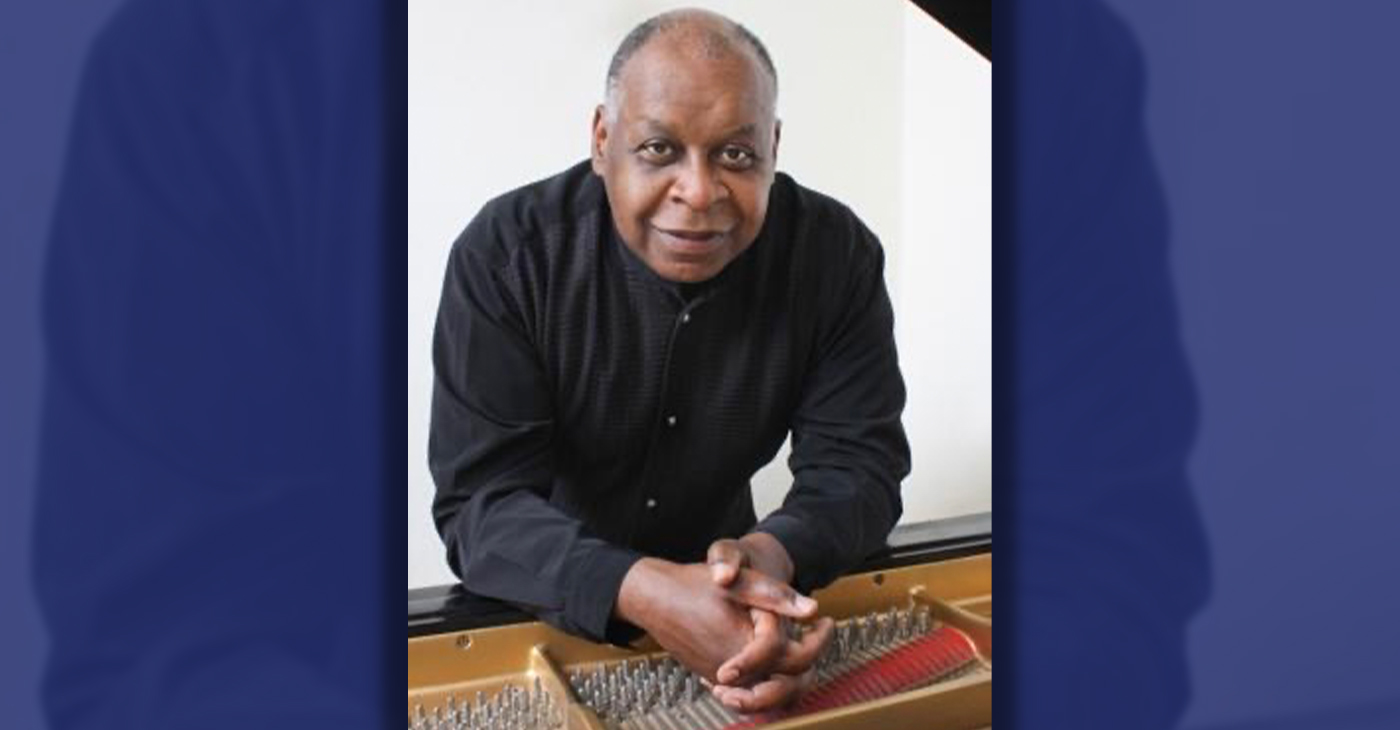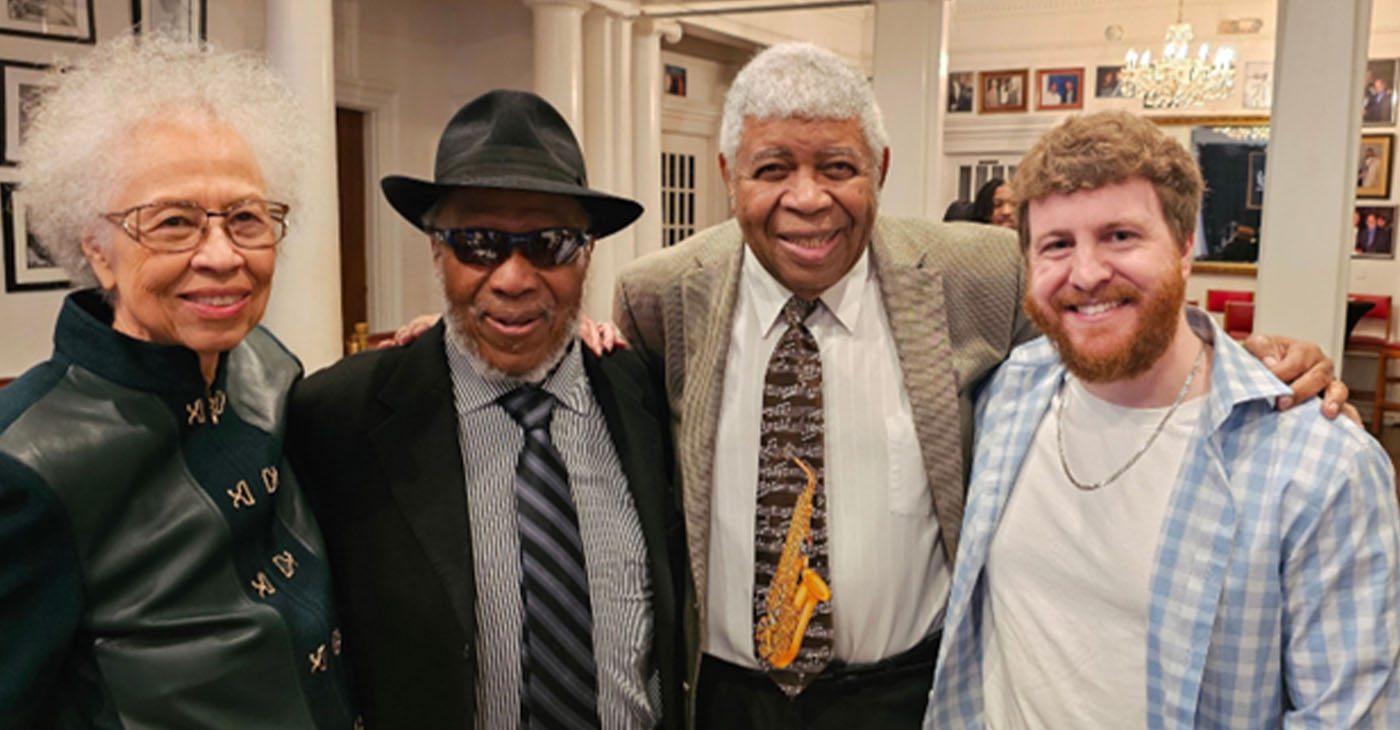Arts and Culture
‘Put Ur Play On’ Productions Showcases Local Talent at Laney College
On Saturday, Feb. 26 at the Laney College Odell Johnson Theater, the Third Annual Black Centric Showcase celebrated Black History Month. The show depicted eras of Black history, while featuring talent showcases of monologues, skits, dance, rap and singing expressing the past, present and future.

By Carla Thomas
On Saturday, Feb. 26 at the Laney College Odell Johnson Theater, the Third Annual Black Centric Showcase celebrated Black History Month. The show depicted eras of Black history, while featuring talent showcases of monologues, skits, dance, rap and singing expressing the past, present and future.
“The showcase was designed to feature talented members of the community performing all eras of Black history: Where we are from, where we have been, and where are we going,” said Saleemah Jones, production company founder-producer of “Put Ur Play On” with assistant director Angel Galloway.
Pamela Terry performed a monologue spun from August Wilson’s “Fences.” Terry responded to a casting call ad for the role. “Through my audition I learned about the production company, Saleemah Jones, and assistant director, Angel Galloway,” said Terry. “These two sisters are brilliant in their work to improve the quality of life in the community.” She said the experience was both inspiring and challenging.
AKIL of Oakland performed his original song “Gave Us 28,” referring to the number of days in February for Black History Month. “I like to produce positive rap,” said AKIL. “They gave us 28 but every day we make history.”
Other performances featured an original skit on love by Lauren Black and Erynne-Dnae of Cotati, California, and a poem by Oakland middle-schooler Talia Rochelle entitled “Go to the Back, Rosa Parks.” “Rosa Parks is an important, strong, brave woman in Black history,” she said.
Paris Jackson Jr. performed an original dance.
Gary Moore of San Francisco performed a monologue from August Wilson’s “Ma Rainey’s Black Bottom.” Shelly Broadnax performed an original poem entitled “MIBPOC,” about having to check the ‘other’ box when filling out surveys and applications.
IMAC FADICHI of Chicago performed an original rap, “The Good Show,” and Pierre Jones of Richmond performed an original monologue entitled, “Black Caesar.”
The second half of the show included the stage production “Unapologetically Black: Here to Facilitate Harm Reduction Services for Those in Need, Inc.,” written by Itoro Bassey, a Nigerian playwright.
“Itoro reached out to us, and we thought it was a great way to put this perspective on our platform to raise voices,” said Jones, play producer.
The production, satiric in nature, explored the seriousness of Black and white race relations including white privilege and white insensitivity toward African Americans in everyday situations.
In one scene a white male doctor talks to a Black female patient in a dismissive manner. At the height of their disagreement, the two actors are frozen in time. A third actor enters, “Dr. Find You an Ally,” performed by Anthony Dixon, who narrates the situation and offers to serve as a white ally for the Black woman for 24 hours at the price of $59.99.
The actors unfreeze and the Black woman joins the narrator, as he explains his services including a bootcamp provided to retrain white perpetrators and transform their behavior into one of respect, understanding and empathy toward Black people.
Actors in the production included Tyler Mae, David Cesari, Shayna Howlett, Toni Rochelle, Ziare Whitelow, Christina Gluszaczak, Harley Ford and Cody Johnson.
“It’s been great to combine a showcase featuring some of the best in Bay Area talent with a stage play production written by a Nigerian sister,” said Jones. “The month may have 28 days, but we are 365 days a year, 24-7 making history,” said Galloway.
Arts and Culture
Kedrick Armstrong: New Music Director for the Oakland Symphony
The Oakland Symphony Announced Kedrick Armstrong as its Next Music Director. In addition to conducting the orchestra’s public concerts, Armstrong will also actively participate in the Oakland Symphony’s many education and community engagement programs, designed to inspire a love of music in people of all ages.

By Post Staff
The Oakland Symphony Announced Kedrick Armstrong as its Next Music Director.
In addition to conducting the orchestra’s public concerts, Armstrong will also actively participate in the Oakland Symphony’s many education and community engagement programs, designed to inspire a love of music in people of all ages.
Armstrong is the successor to previous music director and Conductor Michael Morgan, who passed away in 2021 after a 30-year tenure at the Symphony.
Armstrong will open the Oakland Symphony 2024-2025 season on October 18.
Armstrong, who is 29 and hails from Georgetown, South Carolina, is currently the creative partner and principal conductor of the Knox-Galesburg Symphony.
The Chicago Tribune has praised Armstrong for his ability to “simply let the score speak for itself.” He enjoys a wide range of repertoire, spanning early music to premiering new works, using his joy and curiosity for all music to cultivate understanding and collaboration within diverse communities.
“I am deeply honored and grateful for the opportunity to serve as the new music director of the Oakland Symphony,” Armstrong said. “As a Black conductor, I find it humbling to stand on the shoulders of both Michael Morgan and Calvin Simmons,” the most recent and the first African American music directors of the Symphony, respectively.
Armstrong led three programs at the Symphony between 2022 and early 2024, which showcased his broad knowledge of the classical repertoire and enthusiasm for spotlighting diverse voices.
On his Oakland Symphony subscription debut on Feb. 16, Armstrong led the world premiere of “Here I Stand: Paul Robeson,” an oratorio by Carlos Simon on a libretto by Dan Harder, commissioned by the Oakland Symphony.
Armstrong was selected unanimously by the Oakland Symphony’s board of directors and musicians after an extensive two-year search. “The search committee was overwhelmed by Kedrick’s scholarship and curiosity about all kinds of music, from classical and jazz to gospel and hip-hop,” said. Dr. Mieko Hatano, executive director of the Oakland Symphony. “We are thrilled to have him join us at the Oakland Symphony.”
Arts and Culture
Faces Around the Bay Dr. Carl Blake, Pianist
Born in Liberty, Missouri, Carl Blake, a virtuoso and respected pianist, made his most recent migration to the East Bay in 1999. One might have seen him performing recently at Noontime Concerts in San Francisco, or at the Piedmont Center for the Arts in Oakland. He is Director of Music at The Church for the Fellowship of All Peoples in San Francisco. He was also co-organizer and collaborative pianist at Herbst Theater for The Majesty of the Spirituals concert in 2022 and has held several church positions in the Bay Area.

By Barbara Fluhrer
Born in Liberty, Missouri, Carl Blake, a virtuoso and respected pianist, made his most recent migration to the East Bay in 1999.
One might have seen him performing recently at Noontime Concerts in San Francisco, or at the Piedmont Center for the Arts in Oakland. He is Director of Music at The Church for the Fellowship of All Peoples in San Francisco. He was also co-organizer and collaborative pianist at Herbst Theater for The Majesty of the Spirituals concert in 2022 and has held several church positions in the Bay Area.
Blake obtained a Bachelor of Music from Boston University and continued post-baccalaureate studies in Jamaica before earning a Master of Arts in Music at San Jose State University. He was the recipient of two Fulbright residencies in Honduras and completed a third residency at the University of St. Petersburg in Russia. He has a Doctor of Musical Arts from Cornell University.
At age 19, Blake, then an undergraduate piano major at Boston University, was “discovered” by Impresario Dr. W. Hazaiah Williams, who is the Founder and Director of Today’s Artists/Four Seasons Arts.
Williams honored Blake by awarding him the first Marian Anderson Young Artist Award. Anderson personally presented the award at the Masonic Auditorium in S.F. Subsequently, Blake was presented by Dr. Williams in his San Francisco debut at The Herbst Theatre. Williams subsidized a year of study abroad for Blake at the Paris Conservatory of Music. Additionally, Williams sponsored Blake’s New York Weill Hall debut, where he has performed twice since. Blake performed several times at the Yachats Music Festival in Oregon.
Blake continues to perform nationally and abroad. His hobbies are reading, baking and travel. He says, “I’m still pumping ivories, as Belgian pianist Jeanne Stark described the disciplined practice of concert piano.”
Arts and Culture
Oakland Jazz Great Offers Master Class as City Declares “John Handy Day”
World-renowned jazz master saxophonist John Handy, a McClymond’s High School graduate, was presented with a Mayor of Oakland Proclamation declaring Feb. 12, as John Handy Day in the city. Handy is most notably known as the featured saxophonist for Charles Mingus on “Goodbye Pork Pie Hat” from the album “Mingus Ah Um” (1959) and on “Hard Work” from his own album “Hard Work” (1976).

By Conway Jones
World-renowned jazz master saxophonist John Handy, a McClymond’s High School graduate, was presented with a Mayor of Oakland Proclamation declaring Feb. 12, as John Handy Day in the city.
Handy is most notably known as the featured saxophonist for Charles Mingus on “Goodbye Pork Pie Hat” from the album “Mingus Ah Um” (1959) and on “Hard Work” from his own album “Hard Work” (1976).
“John Handy is a jazz icon and an inspiration to musicians everywhere,” said Ayo Brame, a 16-year-old Oakland tenor saxophone player who is enrolled at the Oakland School for the Arts.
In celebration of this day, the reception in downtown Oakland at Geoffrey’s Inner Circle was a gathering of artists, young and old, coming together in his honor and celebrating his 91st birthday.
Handy presented a Saxophone Colossus free masterclass for musicians. This class afforded a rare opportunity to learn about the saxophone from an aficionado. The class was free and open to all – saxophonists, vocalists, aficionados, students, and casual listeners.
“As a longtime friend for over 60 years, and fellow musician who has had numerous opportunities to share the stage with John, it has always been a pleasure performing with him and hearing his creative interpretations of the music and his gift of ease inspiring the next generation of jazz musicians,” said Roger Glenn, a multi-instrumentalist.
-

 Activism4 weeks ago
Activism4 weeks agoOakland Post: Week of March 27 – April 2, 2024
-

 #NNPA BlackPress4 weeks ago
#NNPA BlackPress4 weeks agoCOMMENTARY: D.C. Crime Bill Fails to Address Root Causes of Violence and Incarceration
-

 #NNPA BlackPress4 weeks ago
#NNPA BlackPress4 weeks agoFrom Raids to Revelations: The Dark Turn in Sean ‘Diddy’ Combs’ Saga
-

 #NNPA BlackPress4 weeks ago
#NNPA BlackPress4 weeks agoCOMMENTARY: Lady Day and The Lights!
-

 #NNPA BlackPress4 weeks ago
#NNPA BlackPress4 weeks agoMayor, City Council President React to May 31 Closing of Birmingham-Southern College
-

 #NNPA BlackPress4 weeks ago
#NNPA BlackPress4 weeks agoBaltimore Key Bridge Catastrophe: A City’s Heartbreak and a Nation’s Alarm
-

 #NNPA BlackPress4 weeks ago
#NNPA BlackPress4 weeks agoBaltimore’s Key Bridge Struck by Ship, Collapses into Water
-

 #NNPA BlackPress4 weeks ago
#NNPA BlackPress4 weeks agoBeloved Actor and Activist Louis Cameron Gossett Jr. Dies at 87














































